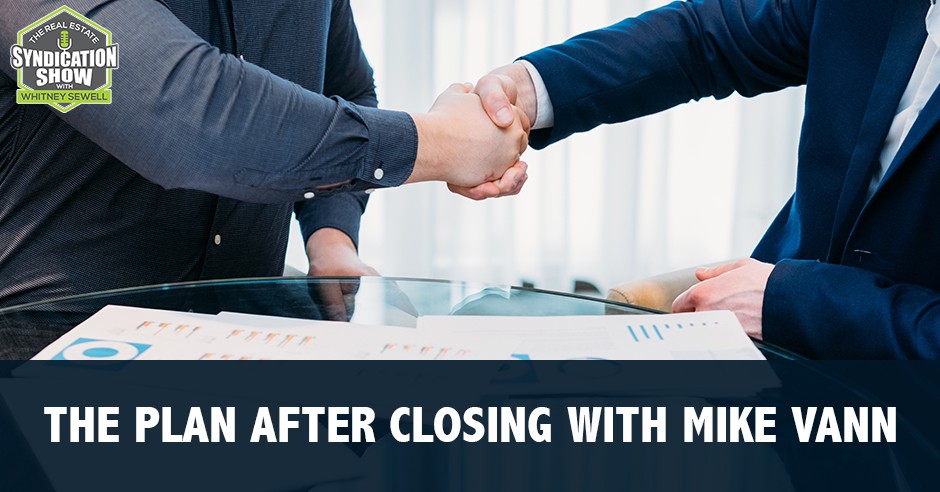Listen to the podcast here:
Real estate investor Mike Vann talks about what he likes most about real estate investing and how he is now experiencing a promising syndication journey by providing homes for Google employees. Mike has been investing in real estate for over fifteen years and has built a $6M personal portfolio. Going over a significant deal right now, which is a 100-unit C-class property in Oklahoma – home to one of Google’s server farms – he shares the events that transpired after closing the deal with Google and the game plan they have put in place. With this huge ongoing project working with Google folks, Mike stresses the necessity to understand tenant profile concentration in anticipating problems and having a smooth workflow.
—
Watch the episode here:
The Plan After Closing with Mike Vann
Our guest is Mike Vann. Thanks for being on the show, Mike.
Thanks for having me. I appreciate it. I’m glad to be here.
I’m honored to have you on the show. I look forward to our conversation. Mike has been investing in real estate for several years throughout Arkansas and Missouri and has built a $6 million personal portfolio across multiple asset classes consisting of single-family, small multifamily, apartments and commercial properties. He has completed many flips, rehabs and even a heavy lift $7,000 per door apartment complex renovation over the last several years. In 2017, he began apartment syndication and had since been involved in the purchase of over 825 units in Kansas, Oklahoma and Fort Worth, Dallas. Mike, give the readers a little more about who you are, where you’re from and what your focus is.
I have been a real estate investor for several years. I started out like a lot of other people in the single-family, small multifamily and things like that. Over time, I decided to scale up, get a little bit bigger multifamily and some smaller apartment complex and so forth. Being in Corporate America, having a full-time job and, at the same time, trying to do this, Corporate America has made me realize that I’m only as good as my last quarter. That was one of the why’s behind real estate investing. Initially, it was to create security and wealth for the future and also not to rely so much on Corporate America. Over time, I feel we are blessed to be a blessing and I’ve been blessed over the years. More so than the wealth creation that real estate investing can give you is the time freedom that I value, not only to have more time with my family but also to give back. Mission work is a big part of my life. We’re not only heavily involved in the community here but also, we started doing some international work. We went on a few trips. That’s one of the big reasons why I like real estate investing and have geared myself to hopefully retire myself in Corporate America in the next few years.
It’s a big push to do this job well and to be able to have that time freedom, have more time with the family and do the mission work. Tell me a little about your syndication journey. What was the deal you all did? We’ve had your partner on the show. We discussed the deal. I’d like for us to talk about that deal and maybe give us an update as well. In case the readers don’t know, give them a little more background on that property.
My partner Rodney Miller had been on the show prior. We were getting ready to close or maybe had just closed on the deal at that time. This is a 100-unit C class property in a market east of Tulsa, Oklahoma. I would never have imagined myself buying an apartment complex in Pryor, Oklahoma. It’s a small town but the key factor, one of the decision makers in us pursuing the deal was this is home to one of Google’s server farms. They had come in in 2011 and since invested over $2 billion in this community and have continued to expand their facilities. They have purchased and built on to their existing facilities, purchased other facilities, built more and keep adding jobs. There aren’t enough places to live.
Everything there within twenty miles is full. There are not enough places to live. Google came in and announced a several hundred million-dollar expansion on this facility, specifically. Before they can even start this, there’s further expansion. There are going to be jobs coming into this community for years to come. Google is not stand-alone. Even though we know Google is not going to go anywhere, there are Fortune 500 companies in the mid-American industrial park there. It’s a diverse economy with a lot of jobs and a plan to be coming in the near future over the next several years. That combined with the fact that the demand for housing there led us to go ahead and pull the trigger on the deal.
[bctt tweet=”In corporate America, you’re only as good as your last quarter. ” via=”no”]
I appreciate you mentioning about having a diversified job selection. We feel like Google is going to be around for a while. Still, I wouldn’t feel comfortable if that was pretty much the only main employer and that there weren’t any other large employers as well but them building on is a great sign. Why did the sellers sell the property?
We bought the property from Mitt Romney’s son. They are focusing more out in the Utah area and in disposing their assets outside of that area, in the general vicinity. They had sold some other properties in Wichita and some other areas in the Midwest. We’re focusing closer to home.
Rodney’s show was WS199 if you want to go back and hear more about the property when they were in that process of closing. I can’t remember the exact process if you all had closed yet or not but you’re closed. Let’s talk about what has happened since the close and some things that have happened that were unexpected and what has happened since then. Since the close, what game plan did you all put in place?
The property was fairly full when we took it over. It’s 97% or something like that. One of the things that we didn’t uncover was how many short-term renters were there. We did a lease audit and all that. We knew that there were a certain amount of short-term renters. There ended up being a lot more than we’re shown clearly on some of the leases. Upon the day of the takeover when we had our unit walk, there were some people that had moved out that were there on paper but not there physically. We had a little bit lower physical occupancy when we came onto the property, which is not a big deal. We put our team in place and went to work.
Over time, we came to find out that the local manager that they had there in place didn’t have a lot of rules. People decided they were done with their lease with no notice and moved out. The thing I would learn from that is you can look at the lease files on paper and do your due diligence on that but maybe ask more and better questions to get a clearer picture of what the true tenant profile is like. Be able to anticipate a little bit more. It hasn’t hurt us financially. We were able to turn right around and get those units we rented. Because of the demand, we had already rented several units that are pro forma rents, which were quite a bit higher than the previous owner had in there. We got them up to the market.
If there was that much demand, it might have been a blessing that those people moved out. What questions should we be asking so that doesn’t happen to us?

It may be tenant concentrations. With a lot of the construction that was going on there because of Google, a lot of Google’s 1099 workers or the Google folks that were coming were on short-term contracts, maybe tenant concentration and their specific policies on the move out notices. Typically, we have a 30-day notice. There wasn’t a 30-day notice or it wasn’t being enforced. It was in the lease but wasn’t being enforced. You want to know your tenant profile concentration of employers within your tenant profile and be able to anticipate those types of problems. It’s not that you can do anything about it because they’re already there, but at least it lets you get a game plan around that when they do move out.
Was the seller self-managing or was it third-party management?
It was a third-party manager. They found some guy in the local community and had him come in and run it. He was a very stern guy. He was a fair housing nightmare. We didn’t keep him on. It was a third-party management company. I don’t think there was a lot of oversight. These folks were on the other side of the country. This is a small asset for them. They admittedly said it was ignored somewhat. They prettied it up a little bit before they disposed of it. It’s going to turn out to be a great asset for us.
Tell me what has happened since the close? You’ve got rid of the old manager and got a new manager. What was the game plan with this property? Is it a value add? Is it remodeling units or getting better tenants? What did you do to increase the value?
It was more of going in. There were a few rehab units. Probably 90% of them already had full the partial rehab so there wasn’t a lot of CapEx to be done. Some have a little deferred maintenance on the exterior, stripe and silver parking lot. That’s being done now. Also, new landscaping and rebranding the property. We’re going to add or extend the laundry facilities and make it a lot larger. We’re going to put more grilling stations around the community. We held our first resident event, a barbecue. We’re doing more of those to create more community among the residents so we can get better tenants and keep them longer.
Tell me how you hired another manager. Did you hire somebody personally that’s working for you all or did you hire a completely third-party management company?
[bctt tweet=”You can’t go chasing a deal just so you can get it. Stick to your fundamentals and make sure it’s going to work once you get it. ” via=”no”]
We do have a third-party manager. Trinity MultiFamily is a large outfit. They manage about 24,000 units in fifteen states. They manage one of my other complexes in Arkansas. They have an offset of Tulsa. Their regional came in. When they posted the job, one of the vendors they had known for seven years was from prior. She wanted to get back home. She was the first one to apply. They hired her because I knew she’d be a home run and she has been.
What are some things she has implemented that the previous manager didn’t and has been key to getting this property operating successfully?
The biggest one is a sense of community. She cares for the tenants and the residents. That was the one thing I noticed at the event. A lot of the residents come up and give her hugs. She treats them like family. That’s one of the core values we have. This is a business but these are people. Just because they maybe not in the same demographic as you are, it doesn’t mean they deserve any less. They need a clean, safe and affordable place to live. We can treat them like we would treat our own family.
What’s the hold period for this property?
The planned hold period is five years.
Tell me a little more about how you all plan to increase rents or to raise the NOI? What’s the biggest way you all are doing that?

The expansion of the laundry room is one of the ways. There are vending machines on the property now. There were no contracts. They don’t own them. They let some outside guy come in and put as many machines there. He runs them and gets all the money. They do own all the laundry equipment. There were four units down when I was there. We’re going to take out the existing shop, double the size of the laundry facility and purchase our own vending machines. Not only will it be a nice, large, newer place for the residents to come in and do their laundry, but they’ll also have a place to sit down, watch TV and eat a snack. They have a folding table there to fold their laundry. It will be a nice value add amenity. At the same time, by getting working machines and adding four sets of washers and dryers, we’re going to create probably another $500 a month minimum in other income. If you translate that at an 8% cap rate, it’s roughly a $75,000 increase to our property value.
Going forward, are you looking for more properties similar to this? Are you all staying with class C? What’s your desire as far as moving forward, maybe even the type of your buying criteria going forward?
B and C is our sweet spot. We don’t have a preference for one over the other. It depends on what deals come along if they pencil out, but B and C is our primary focus. My partner, Carl Suverkrop is in the Dallas Fort Worth area. Rodney Miller is in the Oklahoma City area. I’m here in Springfield, Missouri. We have a wide swath of area that we can get to within a short drive. It’s a lot of ground to cover. We’re looking for deals primarily in those areas and in the some of the markets that are in direct flights. There’s been enough deal flow in this area that we can drive to that we haven’t had to reach out or get on a plane yet. We have a couple of deals in Indianapolis. We got to invest and final on a $20 million deal. We didn’t get it. It’s disappointing but it’s okay. It’s a good market.
Can you elaborate on why you weren’t chosen? Do you know?
I know. We were about a million over-asking. We got outbid by $800,000. It was primarily because we did have a local partner on the ground there. We represented in the market. The purchaser was also a local group. They were also someone that was vertically integrated. They had their own construction company. We’re able to pay a little bit more because of the costing that they’re going to have from having in-house construction. They had also lost out on the deal the previous time it was on the market. It was a little bit personal for them. They put down a $2 million earnest money. It’s $250,000 hard day one. They did want it. We stuck to our fundamentals. We did what was right for our investors and us by the bid that we put in. You can’t get emotional about it. You can’t go chasing the deal just so you can get it. You go to stick to your fundamentals and make sure it’s going to work once you do get it.
You’ve been in real estate for a long time. You’ve been in different asset classes. You’ve built a portfolio. Before you even got into syndication, you are successful in real estate. What’s been the hardest part of the syndication experience for you or the journey so far?
[bctt tweet=”To gain success, you got to roll with the punches sometimes and stay after it. ” via=”no”]
It’s learning to be flexible. When you’re investing in your own portfolio, you control everything. You’re not dealing with partners and investors. You’re dealing with your guy at the local community bank for the most part. Being flexible is one of the biggest things that will lead to success. It’s being able to navigate those different channels when they pop up and being able to manage different personalities. It’s also persistent. You’ve got to look at a lot of deals. We get a lot of deals before you find one that will work. Once you find one that works, it’s getting it across the finish line to win the deal. Beyond that, it’s getting it closed. It can be a long, arduous process with a lot of hoops to jump through. You’ve got to be persistent and flexible. Don’t take things personally.
You’re all working as a team. There are three guys that are making this happen. How do you all communicate? How do you all stay on top of tasks? Do you use some special CRM or task management software?
We use a shared Dropbox file. We’re looking at Slack as well. It’s a little bit more of a learning curve with Slack. We may move there. Now we’re doing a shared Dropbox folder. We keep everything in there so we always have access to it. We talk every day, multiple times a day. When we’re in a deal, we have specific areas that we will assign. On this deal we’re doing over at Oklahoma, I’m more in charge of the operations. Rodney was in charge of the legal team. Carl was in charge of investor relations. We divide and conquer.
You all can be focused and know exactly what’s expected of you. It’s important. What’s your best advice for taking care of investors?
Be transparent on your promise, over-deliver and always do what you say you’re going to do. If you do those things, you will be able to have successful deals and happy investors and sustain yourself in the business.
What’s the number one thing that has contributed to your success?
It’s prayer, persistence and flexibility. You’ve got to roll with the punches sometimes and stay after it. It can beat you down sometimes. Also, you’ve got to balance, making sure that you don’t forget the reason you’re doing what you’re doing and focus on your family.
I appreciate you sharing that. Can you tell the readers how you like to give back?
I do mission work. That’s my number one thing. Besides the freedom to spend more time with family, the freedom to have time to do more mission work is my big focus on freeing myself from Corporate America through the passive income that real estate offers. We’re heavily involved with the community. Locally, we do storm relief here within the US and things like that. We did our first couple of international mission trips, one to Ecuador and one to Brazil. We took our kids. They are both phenomenal experiences, not only for us but also for the kids. I’m sure they’ll appreciate it later in life looking back than they do now. They had a great time. They were great sports. It was a phenomenal experience for the whole family.
Thank you so much for being on the show. Tell the readers how they can learn more about you and get in touch with you.
You can learn more about our company at TridentMultifamily.com. My email is [email protected].
Mike, thank you so much. I appreciate your time and sharing your experience in this deal and what you learned so far after closing. A lot of times, there are things we don’t expect that happens and you have to roll with it. Hopefully, you’ve prepared for it. There are usually things that you can’t prepare for as well at times. I appreciate your time. I appreciate the readers being with us every day. I hope you’ll go to Life Bridge Capital and connect with me as well. Go to the Facebook group, The Real Estate Syndication Show. We will talk to you soon.
Important Links:
- Mike Vann
- Rodney Miller
- WS199 – Previous episode
- Trinity MultiFamily
- Carl Suverkrop
- Dropbox
- Slack
- TridentMultifamily.com
- [email protected]
- The Real Estate Syndication Show – Facebook Group
About Mike Vann

In 2017, after years of informally helping people through advice, mentoring and sharing his knowledge of the business, he decided to formalize and scale those efforts to help other busy professionals realize the security and freedom that can be attained through real estate investing. He is achieving those goals through apartment syndication and has since been involved in the purchase of over 825 units in Kansas, Oklahoma and DFW.
Besides educating and helping busy professionals work their way towards financial freedom, Mike enjoys being involved in local, national and international mission work and believes “We are blessed, to be a blessing”.
Love the show? Subscribe, rate, review, and share!
Join the Real Estate Syndication Show Community:



